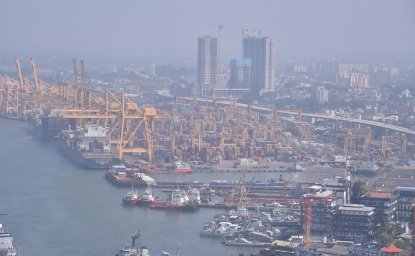
A blog of the Indo-Pacific Program
In recent weeks, the United States has approached Indonesia to join the Mineral Security Partnership (MSP), a coalition of 14 countries and the European Union aimed at securing critical mineral supply chains. This initiative emerged out of a broader discussion about establishing a limited or critical minerals-specific free trade agreement (FTA) between the United States and Indonesia.
Indonesia, recognizing the potential of this partnership, has begun efforts to reduce the proportion of Chinese involvement in its nickel smelting projects, with the aim of qualifying for US subsidies under the Inflation Reduction Act (IRA). Starting in 2025, the IRA will offer tax incentives for electric vehicles (EVs) but exclude those that contain critical minerals linked to "foreign entities of concern." This is an issue for Indonesia considering that Chinese companies, such as Tsingshan Holding Group, Zhejiang Huayou Cobalt, and Ningbo Lygend, have built over 90% of Indonesia’s nickel smelters.
...Jakarta is increasingly aware of the risks associated with such concentrated foreign influence.
For both Indonesia and the United States, reducing dependency on China in the critical minerals sector is a strategic imperative. Indonesia wants an "independent and active" foreign policy that avoids overreliance on any single power. While Chinese investment has been pivotal in developing Indonesia's nickel industry, Jakarta is increasingly aware of the risks associated with such concentrated foreign influence. Diversifying investment sources, particularly through closer ties with the United States, aligns with Indonesia's broader goals of ensuring its economic sovereignty and strengthening its geopolitical standing. However, Indonesia is keen to ensure that this diversification strategy serves its interests, bringing not just capital but also technology transfer, environmental sustainability, and long-term economic benefits.
The United States meanwhile sees reducing dependency on China in the critical minerals sector as a matter of both national security and domestic political stability. As the United States pushes forward with its green energy goals under the Inflation Reduction Act, there is mounting pressure from lawmakers and industry stakeholders to secure reliable, non-Chinese sources of critical minerals like nickel. The dominance of Chinese companies in Indonesia’s nickel industry heightens the risk of supply chain disruptions, which could lead to price volatility and jeopardize the United States' ability to meet its electric vehicle production targets. Domestically, this dependency fuels political concerns over economic sovereignty and the potential for China to exert undue influence over critical US industries. By strengthening ties with Indonesia and encouraging diversification away from Chinese investment, the United States can not only secure its supply chains but also address these domestic concerns, demonstrating a commitment to reducing foreign dependencies and protecting American jobs in the burgeoning green energy sector.
Deeper US-Indonesia cooperation in the critical minerals sector presents a strategic opportunity that addresses key vulnerabilities while aligning with long-term national goals in both countries. As the United States seeks to secure its supply chains, critical mineral supply chains must be expanded at every stage—from extraction to processing and recycling. The timing is ideal, as the partnership aligns with the vision of Indonesia’s next president, Prabowo Subianto, and his vice president, Gibran Rakabuming Raka, who aspire to make Indonesia a "green energy superpower." Joining the MSP would be a significant first step in demonstrating Indonesia’s commitment to sustainable development and responsible mining practices—an essential consideration in any future FTA negotiations with the United States.
Addressing the Disconnect
Yet, neither the United States nor any other nation is currently equipped to replace China in the intermediate stages of critical minerals processing. Attempts at "friend-shoring," or relocating these processes to allied countries, are unlikely to reshape the industrial geography of critical minerals in the short term and may increase costs, particularly for developing nations. Added to these complexities, the US-Indonesia relationship has experienced several bumps in the road.
Despite recent efforts to strengthen ties through the Comprehensive Strategic Partnership (CSP), the bilateral relationship is often criticized as being more symbolic than substantive. There is certainly wariness on both sides, including on economic engagement. In particular, the United States remains concerned about Indonesia's limited labor and environmental protections, as well as the dominance of Chinese investment in Indonesia's critical minerals sector.
On the other hand, Indonesia views the United States as inconsistent in its commitments and often favoring relationships with other regional players like Vietnam and the Philippines. In Jakarta, there is growing skepticism about the Indo-Pacific Economic Framework (IPEF), which is seen as lacking substance, particularly since it excludes market access to the United States. The $20 billion Just Energy Transition Partnership (JETP) has also faced noticeable delay in delivery, and domestic opposition in the United States recently derailed a proposed limited free trade agreement on critical minerals. Diplomatic relations were further strained when President Biden skipped the 2023 ASEAN Summit, and ongoing disagreements over the Hamas-Israel conflict have added to the tension. Unlike the US-Vietnam Comprehensive Strategic Partnership, which was bolstered by significant deals in critical technology and minerals, the US-Indonesia CSP has seen only modest involvement from US companies like ExxonMobil and Chevron in decarbonization efforts.
This perceived lack of sustained US engagement contrasts sharply with China’s consistent economic involvement in Indonesia...
This perceived lack of sustained US engagement contrasts sharply with China’s consistent economic involvement in Indonesia, deepening Jakarta’s doubts about American reliability. While Indonesia is committed to maintaining an "independent and active" foreign policy, it also seeks to ensure that closer ties with the United States deliver concrete benefits.
To bridge this disconnect, the United States needs to adopt a more consistent approach to further its own strategic interests and to enhance its position as a reliable partner. One promising avenue is to focus on expanding and modernizing Indonesia's refining capacities, ensuring they are both economically viable and environmentally sustainable. This could be achieved through targeted investments, sharing technical expertise, and introducing advanced green technologies. The United States also has a unique opportunity to play a pivotal role by broadening the scope of JETP to include initiatives aimed at transitioning Indonesia’s nickel processing plants from coal to renewable energy sources. By providing additional funding and technical assistance, the United States could accelerate this critical shift, helping Indonesia not only reduce its carbon footprint but also maintain—and even enhance—its competitive position in the global nickel market.
Moreover, the United States should work to involve Indonesia in international discussions on deep-sea mining. Countries like Japan, the United States, and China are increasingly interested in exploring the vast resources under the ocean as a potential way to diversify supply chains for critical minerals. However, deep-sea mining is a long-term prospect that requires careful regulation to mitigate the potential impact on marine ecosystems. By bringing Indonesia into these discussions, the United States could help shape sustainable practices and ensure that any future deep-sea mining activities are conducted responsibly.
For Indonesia, meanwhile, cooperating with the United States on critical minerals involves capitalizing on the current demand for nickel, but also securing its long-term prosperity and solidifying its status as an emerging geopolitical power. Indonesia has aspirations of joining the OECD and becoming a developed country, but to achieve this, it must move beyond being a mere exporter of raw materials. The looming shift from nickel-manganese-cobalt (NMC) to lithium iron phosphate (LFP) batteries in the EV market and the environmental concerns associated with nickel mining underscore the need for Indonesia to diversify its economy and attract investment in sustainable industries.
Critical Minerals, Critical Choices: What Comes Next?
The strategic and economic case for cooperation in critical minerals is strong. To avoid the pitfalls of overdependence on commodity exports like nickel and to ensure its long-term prosperity, Indonesia must diversify its economy beyond extraction. Strategic investments in value-added industries such as solar energy, battery manufacturing, and sustainable infrastructure are essential. For the United States, partnering with Indonesia on these fronts offers a chance to secure a stable supply of critical minerals while also promoting broader regional stability and economic growth. If the United State does not engage meaningfully with Indonesia, the country may deepen its ties with China, where environmental and labor standards are less stringent. This could exacerbate global environmental issues and limit US access to the critical minerals needed for its green transition.
Moreover, the potential exclusion of Indonesian nickel from US markets due to the Inflation Reduction Act (IRA) could inadvertently disadvantage US manufacturers. As supply chains are being forged today that will shape economic relations for decades, a failure to collaborate could result in the United States being entirely locked out of the EV market in a worst-case scenario. According to S&P Global, by 2035, an estimated 90% of global nickel supplies not covered by US free trade agreements. Imposing restrictive measures on Indonesian nickel, simply because of the involvement of other nations, would undermine US interests and contradict the assurances given by Treasury Secretary Janet Yellen that Indo-Pacific allies should not be forced to choose between the United States and China.
A strategic US-Indonesia partnership on critical minerals is crucial for securing the future of green energy. By expanding collaboration beyond nickel, ensuring adherence to high environmental and labor standards, and fostering sustainable development, both nations can achieve long-term prosperity and solidify their positions as global leaders in the green energy transition.
The views expressed are the author's alone, and do not represent the views of the U.S. Government or the Wilson Center. Copyright 2024, Indo-Pacific Program. All rights reserved.
Follow the Indo-Pacific Program on Twitter @IndoPacific. or join us on Facebook.
Author

Indo-Pacific Program
The Indo-Pacific Program promotes policy debate and intellectual discussions on US interests in the Asia-Pacific as well as political, economic, security, and social issues relating to the world’s most populous and economically dynamic region. Read more







